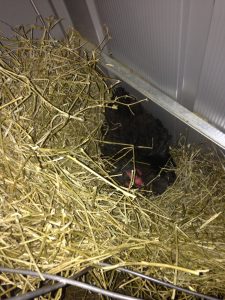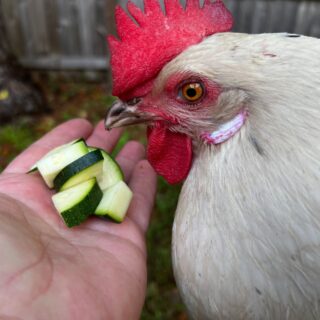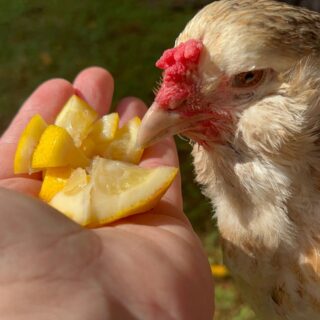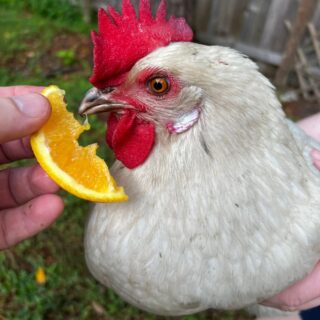Have you ever wondered about hatching chicks with a broody hen? Ok, I will admit, on the surface this seems so simple. I mean, afterall, broody hens hatched chicks for a long time before people learned to hatch chicks with incubators.
If you are thinking about letting a hen hatch her own chicks, first you need to know:
What is a Broody Hen?
A broody hen is basically a hen that has decided to sit on the eggs she (or possibly some of her flockmates) have laid in order to hatch them. Broody hens, will stay on the eggs pretty much day and night. They do get up occasionally for food and water.
Broody hens will also get a little rough looking sometimes. They will usually really puff themselves and their feathers up, particularly if you get close to them. They will also, sometimes, pull their chest feathers out - this is to provide enough body heat to the eggs to keep them at the right temperature for incubation.
A broody hen will also usually get quite testy if you get near her and her eggs. And she will most certainly try to peck you if you try to move her or touch her eggs.
What if you have a broody hen, but you don't want her to hatch any chicks?
How to Stop a Broody Hen
There are several ways to stop or break a broody hen. If one of your hens goes broody, you may want to stop them. Perhaps you don't want chicks at that time, or maybe you don't have fertile eggs. Broody hens stop laying eggs, so if you don't want them to hatch chicks, it is best to break them.
It is pretty easy to figure out how to stop a broody hen, essentially you want to get her off her eggs and nest. So, you should collect eggs as often as possible so that she doesn't have eggs to sit on. You should also remove her from the nesting box as often as possible and even consider blocking that nesting box off so she can't get back in for a few days.
One day we decided (spur of the moment) to take some eggs out to one of our broody hens. This particular girl was SUPER committed, she had been brooding in our goats hay feeder for two months.
Despite our best efforts, we could not break her from being broody. So, we gave in and let her hatch some eggs.
What happens after you give your broody hen eggs to hatch?
Once your broody hen has her fertile eggs you can pretty much leave her to her own devices. There are a few things you will want to watch for:
1. Make sure she stays broody
Sometimes, for whatever reason, a broody hen will decide to leave her nest part way through. If this happens, you might need to fire up your incubator. one of the best egg incubators is a Brinsea.
2. Make sure she gets up to eat and drink
Your broody hen doesn't need to stay on the eggs constantly for the entire 21 days. She will get up to eat and drink.
However, she should not be off the eggs for lengthy periods of time. To help her out, you might want to move food and water close to her.
In the case of our broody hen, she had a daily routine for getting her own food and water. Not all hens will make it as easy as she did for us.
Our girl would hop out of the hay feeder every morning when I opened the stall door.
She would stick her head in the goat's water bucket, fly over the fence, and find something to eat. After a few minutes, she would fly right back over the fence, stop for another quick sip from the water bucket, and nestle right back down on her soon to be hatching eggs.
3. Keep her safe
Other chickens may pick on your broody hen. Or even try to push her off her nest. So, just keep an eye out and make sure no one is bullying her.
We have a large dog, Buffy, living with our goats as a livestock protector. She has discovered that fresh eggs are a delicious and convenient treat.
She will wait for a hen to lay an egg and immediately charge in, barking, until the hen abandons her egg. If the hen is not very motivated to move quickly, Buffy will sometimes snap at them in encouragement. Luckily, this has not been a fatal practice but it can be stressful and dangerous.
Because of this, we will sometimes, move the eggs and our broody hen to a safer (and dog free) location.
In short, be aware of your broody hens surroundings and plan accordingly.
What happens after your hen hatches chicks?
This is the part of the process that we were not prepared for. It isn't really too much work or preparation, but you should think about this ahead of time.
Where will your broody hen and her newly hatched chicks go?
The chicks won't need to know all the details of raising baby chicks (like setting up a chicken brooder, heat lamp etc) if you plan to let your broody hen raise them. However, the chicks will be very small and will need a safe place.
In our experience, the rest of the flock somehow knows not to mess with Mama Hen's new babies. But, it is always good to watch closely to make sure no one will pick on the babies.
If there are any issues, you can always section off a part of the coop (or use a crate) to separate the new Mama Hen and her babies from the rest of the flock.
Also, the new chicks will need a chick sized feeder and waterer so they can get to food and water.
Want to see a cute video of a what happens after a broody hen hatches chicks in your flock? Check it out below.
[wpdevart_youtube]ejuPSpzicic[/wpdevart_youtube]
Have you let any of your broody hens hatch chicks? If so, we would love to hear your tips in the comments below!
For More on Raising Chickens, Check These Out:
[pt_view id="3d0b212jvx"]









Kaya says
We decided a few weeks ago to let our Bantam been keep her eggs under her. A second Bantam hen joined her in the nest box. We have had a new chick each day for the last 3 days! So exciting! This is our first time raising chickens. We bought our chickens as chicks earlier this year and it's so neat to see them reproduce! Since I didn't mark the eggs, they will hopefully keep hatching them for the next couple weeks. So we take the chicks out as soon as we see them, and put them in the brooder. All of our brooder supplies were still handy and it only took a few minutes to set it all back up.
Sue says
The last two times we've had a Broody hen and let her try to raise chicks, everything went well until older chicks hatching 2 to 3 days before pecked newer hatchlings to death. If you have a choice, try to make sure all the eggs are relatively the same age when you put them under the hen, so they all hatch at the same time.
Patricia Roix says
I did this last year, very successfully. It was way easier than the brooder, which I'm doing this year due to lack of broody hen. Seriously, she does all the work, which is how God really intended it. I do notice that the chicks were not as friendly as those that I nurtured, but it's a trade-off, I guess. There was the one rooster of the bunch, who turned out to be "abusive", which caused some deaths, including his......but I suppose that can happen unless you are assured of the sexing. I'd recommend it, if you have the opportunity.